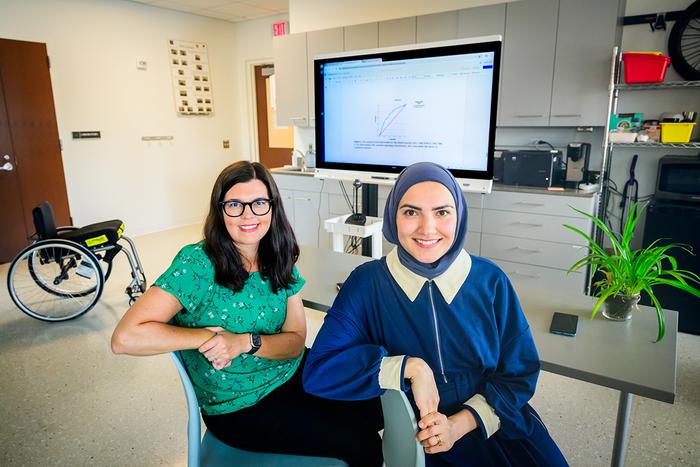CHAMPAIGN, Ill. — Many studies have focused on falls among people who are ambulatory and have conditions like multiple sclerosis or Parkinson’s disease, but research to address falls among those who rely on wheelchairs or motorized scooters is rare, scientists report in a new study. The researchers found that full-time wheelchair or motorized-scooter users also experience falls and fall-related injuries, and many live with the fear of falling again.

Credit: Photo by Fred Zwicky
CHAMPAIGN, Ill. — Many studies have focused on falls among people who are ambulatory and have conditions like multiple sclerosis or Parkinson’s disease, but research to address falls among those who rely on wheelchairs or motorized scooters is rare, scientists report in a new study. The researchers found that full-time wheelchair or motorized-scooter users also experience falls and fall-related injuries, and many live with the fear of falling again.
The findings are detailed in the journal Disability and Rehabilitation.
According to the U.S. Census Bureau, 5.5 million Americans use a wheelchair or motorized scooter to get around. Those who rely on these devices 40 or more hours per week regularly encounter obstacles that thwart their progress and sometimes cause them to fall, said University of Illinois Urbana-Champaign health and kinesiology professor Laura A. Rice, who led the new research with U. of I. graduate student Sahel Moein and Elizabeth W. Peterson, a University of Illinois Chicago clinical professor of occupational therapy.
“Our research has shown that falls among wheelchair and scooter users are typically caused by interacting risk factors,” Peterson said. “These may be physical, behavioral, environmental or psychological in nature.”
“Some key influences on fall risk include driving or pushing over rough terrain, transferring from one surface to another, or reaching for something that’s beyond one’s base of support,” Rice said.
Falls may cause scrapes and bruises or more serious injuries like broken bones.
“While a cut or scrape may seem minor, for someone with diminished sensation, that can quickly turn into a bigger problem,” Rice said.
For the study, the team took a new look at data from an earlier analysis of full-time wheelchair or motorized scooter users who had experienced at least one fall in the previous three years. Each of the 156 participants completed an online survey, answering questions about their demographics and levels of anxiety and depression. The survey also asked about their history and frequency of wheelchair or scooter use, whether they had received training on how to avoid falls, whether and how often they had fallen in the previous year, and how afraid they were of falling. The participants included young and older adults. The median age of the respondents was 33.
The analysis revealed that 96% of the participants reported having fallen at least once in the previous 12 months. Of those, 74% said they had suffered a fall-related injury and 94.6% said they were afraid of falling again. Those who experienced fall-related injuries reported higher levels of anxiety and less frequent use of their wheelchairs or mobility scooters than their peers.
“We were not especially surprised by these findings because walking short distances is essential to daily function for many wheelchair and scooter users,” Peterson said.
“With our study design, we can’t tell what’s causing what. But based on clinical experience and other research — especially among ambulatory people — I think it’s likely that a fear of further injuries is causing some people to limit their activities,” Rice said. “This can lead to something called a ‘disuse disability cycle,’ where you get into this loop of stopping doing things and then your physical capacity declines, and that puts you at more risk of falling. It’s a vicious cycle.”
“We also found that participants who experienced fall-related injuries were, on average, younger than those who did not experience such injuries,” Moein said. “This is in contrast with many of the previous findings among community dwelling adults, where older age was associated with falls and their consequences. So we believe that people who are younger have riskier behaviors, which put them at higher risk of experiencing injuries.”
The findings point to several needed interventions, the researchers said. Because a history of falling is associated with a higher risk of future falls, health care providers should gauge wheelchair and scooter users’ fall risk and offer wheelchair safety training to lessen the likelihood of future falls. The team is testing an intervention they designed to address the specific fall-prevention needs of wheelchair and scooter users. The intervention, which is delivered by occupational or physical therapists, addresses a variety of modifiable influences on fall risk, Peterson said.
“It uses self-management strategies like problem-solving, resource utilization and action planning to build participants’ ability to prevent falls during daily activities,” she said. “Participants also engage in exercise, practice transfer and other wheelchair skills, and create plans to manage falls when they happen.”
The researchers hope to see caregivers and medical providers become more aware of the risk of falling among users of wheelchairs and motorized scooters.
“Health care providers sometimes think that giving someone a wheelchair will solve their problem of falling,” Rice said. “But people need to also be trained to use the new equipment and how to cope with the challenges that come with these devices.”
Rice also is a professor in the Beckman Institute for Advanced Science and Technology at the U. of I.
Editor’s note:
To reach Sahel Moein, email [email protected].
To reach Elizabeth Peterson, email [email protected].
To reach Laura Rice, email [email protected].
The paper “Factors associated with fear of falling and fall-related injuries among people who use wheelchairs and motorized mobility scooters: a cross-sectional study” is available online.
DOI: 10.1080/09638288.2024.2365984
Journal
Disability and Rehabilitation
DOI
10.1080/09638288.2024.2365984
Method of Research
Observational study
Subject of Research
People
Article Title
Factors associated with fear of falling and fall-related injuries among people who use wheelchairs and motorized mobility scooters: a cross-sectional study
Article Publication Date
23-Jun-2024
COI Statement
No potential conflict of interest was reported by the author(s).




